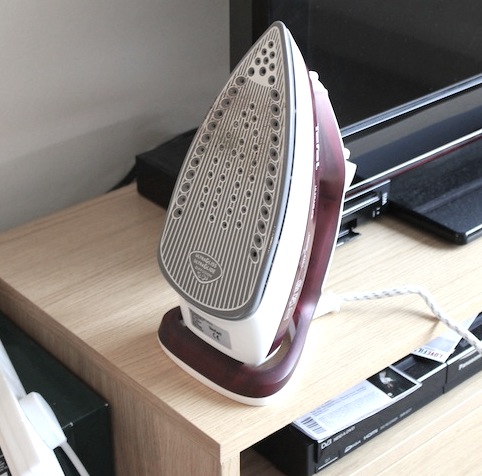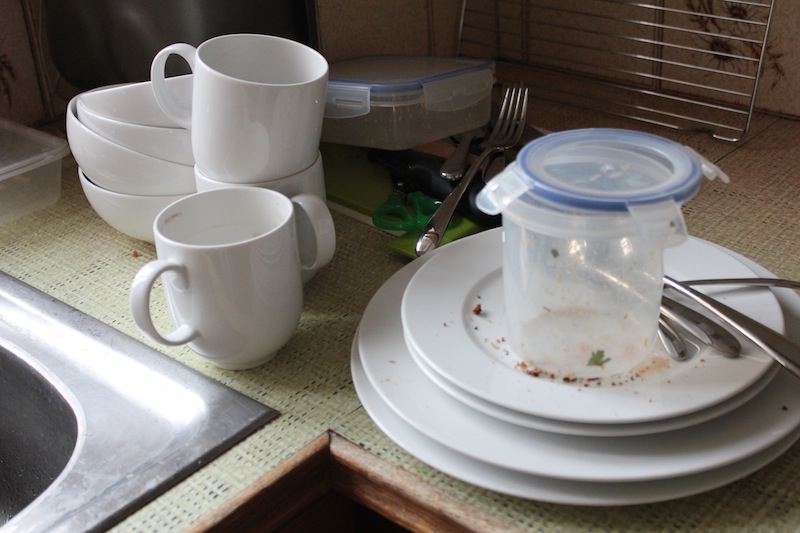Recently, PhD events have meant that, for a while, I have a lot more time on my hands. For a few months I have been in some kind of occupational limbo, and though I have a part-time job, other than that I have felt that ‘homemaker’ well represented a large portion of my role for now.
 Today, for example, I cooked some eggs for breakfast (we’re trying to learn to like them), and set off with a long list of errands in town, in preparation for an upcoming trip. I also did over an hour of ironing (how did that happen?), baking for a friend’s party, and developing a knitting pattern for a project I’d like to work on while we’re travelling.
Today, for example, I cooked some eggs for breakfast (we’re trying to learn to like them), and set off with a long list of errands in town, in preparation for an upcoming trip. I also did over an hour of ironing (how did that happen?), baking for a friend’s party, and developing a knitting pattern for a project I’d like to work on while we’re travelling.
If you know me, you know that this is something I have always loved – and that the description above is basically a paradisal day in my opinion. I’m an introvert, a homebody, and good at finding things to occupy myself. When I got married, I was excited to have a home and an outlet for my love of homemaking, more than I’d had before. I have been curious, however, to see whether in practice I really enjoyed this role, or whether it always seemed so desirable just because everything else was always getting in the way – the grass is always greener, etc.
One of the biggest challenges of homemaking is, I believe, simply our perception that these activities are menial, unimportant, unenjoyable, or basic necessities and nothing more. I don’t feel able to parse all the cultural trends that contribute to this view, but there’s something insidious about it because while I do not overtly believe any of this about domestic work – contrarily, I have always thought it interesting and certainly valuable, and personally quite enjoyable – I feel the constant need to justify this view because I feel inherently insecure in it. I’ve noticed the same with stay-at-home mothers, the genuine belief in the value of their occupation with a simultaneous insecurity and defensiveness. It is, I suspect, due to some kind of internal conflict between what we really think and what we think we should think – or what we think others think we should think.
But clearing away that cobweb of confusion, it’s not particularly groundbreaking to say that if you don’t see your work, whatever it is, as having both some kind of inherent reward as well as being valuable beyond your own enjoyment, you will either be grimly depressed or else hopelessly defensive about it. I would say that for anyone finding themselves in a non-job occupation, whether a role of caring, homemaking, child-rearing, or simply an unintentional period of unemployment, contentment and patience in that role will depend on finding a way to see it as valuable.
In my case, I have never struggled to find homemaking enjoyable, but here is my first point: during this phase of ‘occupational homemaking’, I have needed to find ways of seeing my daily activities as valuable.
But let me anticipate criticism and say – I don’t want this to sound like a project of defending lazy time-wasting by making up ways to see it as valuable. Rather, my second and closely related point is this: I have also needed to have an honest look at my time to find ways to make this role valuable.
In particular, some days have really felt like a lot of ‘pottering’ around being generally active while accomplishing very little that I deemed important. Certainly very little that was interesting to tell Mike when he got home – I washed the dishes, I altered a dress, I cleaned the bathroom, I spent half an hour doing home admin phone calls. Although for the most part I enjoy such a day, it was hard to feel that it had any claim to being really useful or important. At such times what I found most helpful was to ask how the particular advantages of my position could be used for things I did perceive as valuable. Thus, I have reframed quite a bit of housework in my thinking as not merely ‘doing the needful’ that any old body could do, but as serving, chiefly Mike but also as part of serving anyone I cook for or invite over. Because my time is freer, I’ve also been able to visit a few people who have had babies or been ill.
Let me make a third point, though. Namely that I am beginning to wonder if it might be a good thing not to see all your work as hugely valuable in a grand sense – or rather, in the usual senses in which we define valuable work. Maybe having a humbler opinion of one’s own work really represents a more mature understanding of much of the work we actually undertake? Let me explain. It’s becoming fairly commonplace now to malign the overly busy ethic of contemporary Western society, the impulse towards doing things faster, doing more, and so forth. There’s a book on my shelf right now about this very topic, called In Praise of Slow, which I intend to read soon. Of course many reasons are proposed for why we have an addiction to busy-ness, but I often feel that one cause is simply that we are trained that what we do needs to be hugely valuable and important. We are told that we can ‘make a difference’, and that we need to get the skills and do the work necessary to achieve that. And I think we expect that somewhere out there is our true vocation, a career that will verify our meaningful contribution to the world by being so important. It’s natural (I think) to wish to do something meaningful with one’s life, but I wonder if it’s much more culturally specific to us, now, to channel this desire so forcefully into ‘work’ or ‘occupation’ specifically.
If, however, we see our work as hugely important – or feel a need to convince ourselves that it is, or convince others it is – it creates a very clear sense of priority which makes other activities much less worth our time, and hence the objects of scorn and impatience. Isn’t it our scorn for ‘lesser’ activities that makes us rude drivers, grumpy in the post office queue, infuriated with paperwork, or stressed by a host of little things that inhibit us doing what we consider the big things? In which case, I wonder if thinking a little less of our ‘work’ might really be better for our stress and for others around us.
To take a small example, in my errands this morning, I decided to buy some fruit at the market in town but didn’t have enough cash. No problem, there’s a cash machine nearby. For some reason it ate my bank card, with a little internal shudder; it ‘told’ me what it had done via its emotionless blue screen, and didn’t even have the dignity to advertise itself as being subsequently out of service. The nerve. This is the kind of irritating event which has been known to ruin a whole morning for me at times when I had lots of PhD work I ‘ought’ to already be doing. Losing my card created admin to be done, delayed my errands, and of course happened right before a trip so that I can’t even get a new card in time for travelling – nor buy the foreign currency I intended to buy in preparation for said trip. I almost lost my cool. But then I realised – None of what I had to accomplish was really that important or urgent. Neither was a half hour of my time to sort out the mess really that important. I’m a household manager right now – dealing with household problems is part of my job.
Of course there are a few lessons this episode could teach: the value of stopping and breathing, the value of a less jam-packed schedule, or just ‘how much time you have on your hands when you aren’t working full-time, duh’ (I do recognise that). But as a person who easily stresses out over plans gone awry, I noticed my lack of stress and my reasoning for it (the unimportance of a little time), and took this lesson: there is a great relief and freedom in seeing my work (in the form of my to-do list for the day) as being needful but not groundbreaking, useful but not urgent, beneficial but not revolutionary.
In short, this phase of homemaking has both required me to look for value within it, but also to appreciate that the very desire to ascribe so much value to specific work is a crippling habit, and not really necessary to enjoyment or or accomplishment. Dare I say it, the obsession with seeing any work as magnificently important, though apparently so altruistic, is easily a bit self-centred. So I feel that it can be beneficial to look for more unconventional value in the unimportant work, as well as to view the common forms of ‘important’ work in humbler perspective.
